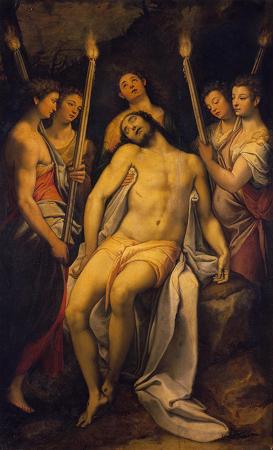Angel. An angel is generally a supernatural being found in various religions and mythologies. Abrahamic religions often depict angels as benevolent celestial beings who act as intermediaries between God and humanity. Other roles of angels include protecting and guiding human beings, and carrying out tasks on behalf of God. Abrahamic religions often organize angels into hierarchies, although such rankings may vary between sects in each religion. Such angels may receive specific names or titles. People have also extended the use of the term angel to various notions of spirits or figures found in other religious traditions. The theological study of angels is known as angelology. Angels expelled from Heaven are referred to as fallen angels as distinct from the heavenly host. In fine art angels are usually depicted as having the shape of human beings of extraordinary beauty but no gender. They are often identified In Christian artwork with bird wings, halos,and light. The word angel arrives in modern English from Old English engel and the Old French angele. Both of these derive from Late Latin angelus, which in turn was borrowed from Late Greek angelos. Additionally, per Dutch linguist R. S. P. Perhaps then, the word's earliest form is Mycenaean a-ke-ro, attested in Linear B syllabic script. If the word refers to some supernatural being, the word angelus appears. Such differentiation has been taken over by later vernacular translations of the Bible, early Christian and Jewish exegetes and eventually modern scholars. Examples of a supernatural messenger are the Malak YHWH, who is either a messenger from God, an aspect of God, or God himself as the messenger Scholar Michael D. Coogan notes that it is only in the late books that the termscome to mean the benevolent semi-divine beings familiar from later mythology and art. Daniel is the first biblical figure to refer to individual angels by name, mentioning Gabriel in Daniel 9:21 and Michael in Daniel 10:13. These angels are part of Daniel's apocalyptic visions and are an important part of all apocalyptic literature. In Daniel 7, Daniel receives a dream-vision from God. As Daniel watches, the Ancient of Days takes his seat on the throne of heaven and sits in judgement in the midst of the heavenly court an like a son of man approaches the Ancient One in the clouds of heaven and is given everlasting kingship. Coogan explains the development of this concept of angels: In the postexilic period, with the development of explicit monotheism, these divine beings, the 'sons of God' who were members of the Divine Council, were in effect demoted to what are now known as 'angels', understood as beings created by God, but immortal and thus superior to humans. This conception of angels is best understood in contrast to demons and is often thought to be influenced by the ancient Persian religious tradition of Zoroastrianism, which viewed the world as a battleground between forces of good and forces of evil, between light and darkness. Philo of Alexandria identifies the angel with the Logos inasmuch as the angel is the immaterial voice of God. The angel is something different from God himself, but is conceived as God's instrument.
more...














